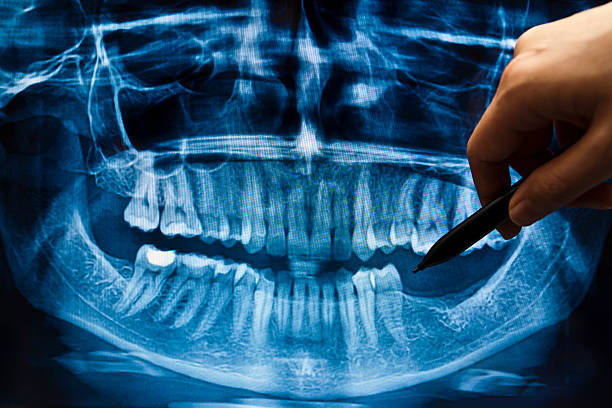The dental implant is unquestionably the best treatment to replace the missing tooth. It gives you natural-looking teeth with a very high success rate, but the treatment is highly complex and time-taking, so sometimes it may fail due to one reason or the other. The procedure involves fusing a titanium-made implant into your jawbone, which serves as a strong foundation for artificial teeth, called crowns. Fortunately, you can stop dental implant failure, if you could notice signs of dental implant failure.
Early and Late Dental Implant Failure

Dentist showing implant area with pen on digital X-Ray computer monitor.
The dental system is highly complex and any invasive treatment, like a dental implant, can cause temporary inflammation and pain. But, if inflammation and pain sustain beyond a reasonable period post medication you should immediately consult your dental surgeon to avoid dental implant failure. Here are some of the signs of dental implant failure:
Pain
Mild pain during early healing days post-implant placing is absolutely normal and your doctor will prescribe some painkiller to help you in painless recovery. But if the pain is sharp and wide across the mouth and jaw, you should get in touch with your dentist immediately as this could trigger dental failure.
Gum Swelling
Just like pain, swelling is also normal post-dental surgeries. In the case of a dental implant, the swelling might last a little longer, but if swelling spread then it could be a sign of infection. If not controlled in time, it could spread to the whole mouth and eventually to blood. If swelling persists, you know what to do.
Chewing Trouble
Dental implant treatment has been designed to ensure natural chewing. The implant takes time to fuse with the jawbone and your dentist will recommend eating restriction during the healing phase. But if you are feeling pain or discomfort in chewing or eating post healing period, it is a sign of dental implant failure.
Missing Naturality
If done perfectly, you won’t be able to differentiate between natural and artificial teeth fixed on the abutment. If crowns make you self-conscious due to wiggling or movement, then this could be a sign of dental implant failure.
Causes of Dental Implant Failure
The success rate of dental implants is exceptionally high; however, it depends on the quality of the treatment and your oral hygiene. Whatever be the reason, you can stop it from falling by consulting an experienced dental surgeon in time. Some common causes, which could work in combination, of dental implant failure, are:
Early Rejection
The human body reacts to the entry of any foreign object, but with proper medication in a few days, the body accepts it. But in some highly allergic cases, the body rejects the metallic dental implant, thus triggering inflammation and pain.
Late Rejection
The titanium-made implant fuses effectively with the jawbone in most cases. But if dental hygiene is not good, this could lead to rejection. This post-fusion failure with similar swelling and pain signs is called late rejection.
Older Implants
Dental implants are designed to last longer, not forever. Depending on your dental structure, chewing habit, and oral hygiene it may wear out earlier than expected. So, if you are noticing any sign of dental implant failure, you should consult your dentist to know about advanced dental implant options.
Poor Oral Hygiene
Unlike natural teeth, dental implants aren’t susceptible to natural decay. But, any infection in your mouth could impact your soft gum tissues and jawbone. So, if you are not maintaining the best dental hygiene practices you might be inviting implant failure.
What to do if dental implant starts failing?
Naturally, you will be a little cautious with any foreign object in your body. So, if you notice any sign of dental implant failure, you should not take the risk of having anti-inflammation medication beyond a few days. Timing is the key to any successful treatment, you should better consult your dentist to know about the cause of pain or inflammation and start the suitable treatment. Why increase pain and cost, when you can control both easily.
